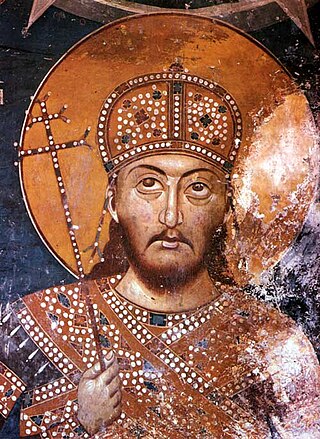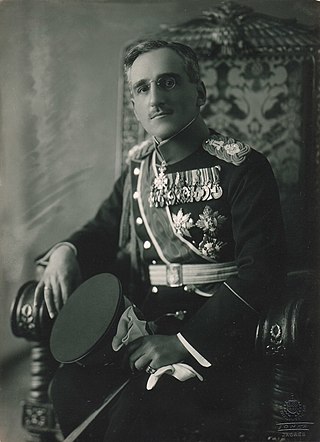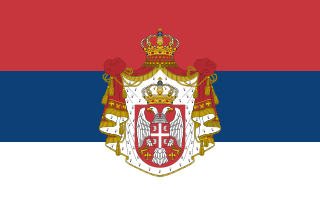Related Research Articles

Gavrilo Princip was a Bosnian Serb student who assassinated Archduke Franz Ferdinand, heir presumptive to the throne of Austria-Hungary, and his wife Sophie, Duchess von Hohenberg, in Sarajevo on 28 June 1914. The killing of the Archduke and his wife set off the July Crisis, a series of events that within one month led to the outbreak of World War I.

The State Union of Serbia and Montenegro or simply Serbia and Montenegro, known until 2003 as the Federal Republic of Yugoslavia, FR Yugoslavia (FRY) or simply Yugoslavia, was a country in Southeast Europe located in the Balkans that existed from 1992 to 2006, following the breakup of the Socialist Federal Republic of Yugoslavia. The state was founded on 27 April 1992 as a federation comprising the Republic of Serbia and the Republic of Montenegro. In February 2003, it was transformed from a federal republic to a political union until Montenegro seceded from the union in June 2006, leading to the full independence of both Serbia and Montenegro.

Serbia, officially the Republic of Serbia, is a landlocked country at the crossroads of Southeast and Central Europe, located in the Balkans and the Pannonian Plain. It borders Hungary to the north, Romania to the northeast, Bulgaria to the southeast, North Macedonia to the south, Croatia and Bosnia and Herzegovina to the west, and Montenegro to the southwest. Serbia claims a border with Albania through the disputed territory of Kosovo. Serbia has about 6.6 million inhabitants, excluding Kosovo. Its capital Belgrade is also the largest city.

Yugoslavia was a country in Southeast and Central Europe that existed from 1918 to 1992. It came into existence following World War I, under the name of the Kingdom of Serbs, Croats and Slovenes from the merger of the Kingdom of Serbia with the provisional State of Slovenes, Croats and Serbs, and constituted the first union of South Slavic peoples as a sovereign state, following centuries of foreign rule over the region under the Ottoman Empire and the Habsburg monarchy. Peter I of Serbia was its first sovereign. The kingdom gained international recognition on 13 July 1922 at the Conference of Ambassadors in Paris. The official name of the state was changed to the Kingdom of Yugoslavia on 3 October 1929.

The Kingdom of Yugoslavia was a country in Southeast and Central Europe that existed from 1918 until 1941. From 1918 to 1929, it was officially called the Kingdom of Serbs, Croats, and Slovenes, but the term "Yugoslavia" has been its colloquial name as early as 1922 due to its origins. The official name of the state was changed to "Kingdom of Yugoslavia" by King Alexander I on 3 October 1929.

Stefan Uroš IV Dušan, also known as Dušan the Mighty, was the King of Serbia from 8 September 1331 and Emperor of the Serbs, Greeks, Bulgarians and Albanians from 16 April 1346 until his death in 1355. Dušan is considered one of the greatest medieval Balkan conquerors.

The Serbian Empire was a medieval Serbian state that emerged from the Kingdom of Serbia. It was established in 1346 by Dušan the Mighty, who significantly expanded the state.
The Ustaše, also known by anglicised versions Ustasha or Ustashe, was a Croatian, fascist and ultranationalist organization active, as one organization, between 1929 and 1945, formally known as the Ustaša – Croatian Revolutionary Movement. From its inception and before the Second World War, the organization engaged in a series of terrorist activities against the Kingdom of Yugoslavia, including collaborating with IMRO to assassinate King Alexander I of Yugoslavia in 1934. During World War II in Yugoslavia, the Ustaše went on to perpetrate the Holocaust and genocide against its Jewish, Serb and Roma populations, killing hundreds of thousands of Serbs, Jews, Roma, as well as Muslim and Croat political dissidents.

Alexander I Karađorđević, also known as Alexander the Unifier, was King of the Serbs, Croats and Slovenes from 16 August 1921 to 3 October 1929 and King of Yugoslavia from 3 October 1929 until his assassination in 1934. His reign of 13 years is the longest of the three monarchs of the Kingdom of Yugoslavia.

The Serbian Orthodox Church is one of the autocephalous Eastern Orthodox Christian churches.

The Bosnian War was an international armed conflict that took place in Bosnia and Herzegovina between 1992 and 1995. The war is commonly seen as having started on 6 April 1992, following several earlier violent incidents. It ended on 14 December 1995 when the Dayton Accords were signed. The main belligerents were the forces of the Republic of Bosnia and Herzegovina, the Republic of Herzeg-Bosnia, and the Republika Srpska, the latter two entities being proto-states led and supplied by Croatia and Serbia, respectively.

After a period of political and economic crisis in the 1980s, the constituent republics of the Socialist Federal Republic of Yugoslavia split apart, but the unresolved issues caused a series of inter-ethnic Yugoslav Wars. The wars primarily affected Bosnia and Herzegovina, neighbouring parts of Croatia and, some years later, Kosovo.

The Kingdom of Serbia was a country located in the Balkans which was created when the ruler of the Principality of Serbia, Milan I, was proclaimed king in 1882. Since 1817, the Principality was ruled by the Obrenović dynasty. The Principality, under the suzerainty of the Ottoman Empire, de facto achieved full independence when the very last Ottoman troops left Belgrade in 1867. The Congress of Berlin in 1878 recognized the formal independence of the Principality of Serbia, and in its composition Nišava, Pirot, Toplica and Vranje districts entered the South part of Serbia.

The Genocide of Serbs in the Independent State of Croatia was the systematic persecution and extermination of Serbs committed during World War II by the fascist Ustaše regime in the Nazi German puppet state known as the Independent State of Croatia between 1941 and 1945. It was carried out through executions in death camps, as well as through mass murder, ethnic cleansing, deportations, forced conversions, and war rape. This genocide was simultaneously carried out with the Holocaust in the NDH as well as the genocide of Roma, by combining Nazi racial policies with the ultimate goal of creating an ethnically pure Greater Croatia.

The assassination of Archduke Franz Ferdinand was one of the key events that led to World War I. Archduke Franz Ferdinand of Austria, heir presumptive to the Austro-Hungarian throne, and his wife, Sophie, Duchess of Hohenberg, were assassinated on 28 June 1914 by Bosnian Serb student Gavrilo Princip. They were shot at close range while being driven through Sarajevo, the provincial capital of Bosnia and Herzegovina, formally annexed by Austria-Hungary in 1908.

The Serbian Cyrillic alphabet is a variation of the Cyrillic script used to write the Serbian language originated in medieval Serbia. Reformed in 19th century by the Serbian philologist and linguist Vuk Karadžić. It is one of the two alphabets used to write modern standard Serbian, the other being Gaj's Latin alphabet.

Aleksandar Vučić is a Serbian politician serving as the president of Serbia since 2017. A founding member of the Serbian Progressive Party (SNS), he previously served as the president of the SNS from 2012 to 2023, first deputy prime minister from 2012 to 2014, and prime minister of Serbia from 2014 to 2017.

Ratko Mladić is a Bosnian Serb former military officer and convicted war criminal who led the Army of Republika Srpska (VRS) during the Yugoslav Wars. In 2017, he was found guilty of committing war crimes, crimes against humanity, and genocide by the International Criminal Tribunal for the former Yugoslavia (ICTY). He is serving a life sentence for these crimes in The Hague.

Slobodan Milošević was a Yugoslav and Serbian politician who was the President of Serbia between 1989–1997 and President of the Federal Republic of Yugoslavia from 1997 until his оverthrow in 2000. Milošević played a major role in the Yugoslav Wars and became the first sitting head of state charged with war crimes.

Saint Sava, known as the Enlightener or the Illuminator, was a Serbian prince and Orthodox monk, the first Archbishop of the autocephalous Serbian Church, the founder of Serbian law, and a diplomat.